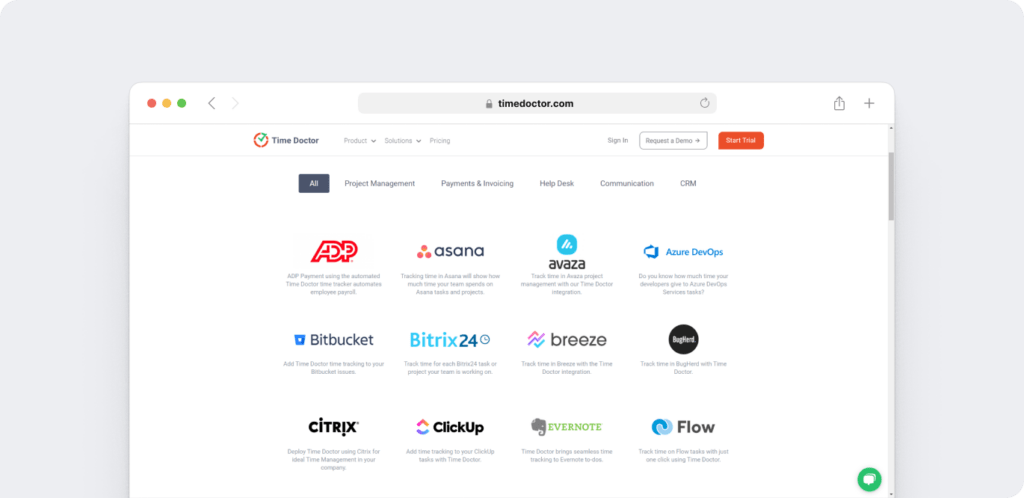2.1K
Wondering what accountability for remote workers means?
Accountability is essential for remote workplace productivity and harmony.
And while working remotely offers many benefits, it has its own challenges.
With a lack of face-to-face communication and limited remote monitoring abilities, it’s difficult to know what your team is working on.
Moreover, if anything goes wrong, how do you hold the right person accountable?
To avoid such situations, you need a culture of accountability.
In this article, we’ll cover what accountability for remote workers means and its importance. We’ll also highlight eight excellent tips to help you build accountability in your workspace.
Table of Contents
Let’s get started.
What is accountability for remote workers?
Accountability means an obligation to accept responsibility for your actions.
For a remote worker, accountability means delivering on a commitment — which not only means completing the assigned set of tasks but also providing quality output.
To elaborate on this, a remote employee’s accountability revolves around a few things like:
- Taking responsibility for their work and performance.
- Keeping to their promises.
- Completing projects within the given timeline time.
- Delivering projects with the desired output.
- Owning their roles and duties towards their organization.
However, a manager’s accountability centers around their team’s success, and the organization’s accountability centers on stakeholder needs and the audience it serves.
Why is remote worker accountability important?
Accountability is important for a workplace, especially in a remote setting.
It ensures on-time delivery, top of the line results, and improved employee engagement.
Let’s take a look at the key benefits of remote worker accountability:
1. Helps build trust
The most significant benefit of remote worker accountability is that it helps build trust.
Since remote teams can be working from any part of the world, instant messaging and phone calls become their primary mode of communication.
And with the possibility of never meeting their team members and being total strangers, trust between teammates becomes a crucial aspect.
Regular team interactions lead to workplace transparency and accountability to deliver on their commitment — which, in turn, builds trust among remote workers.
2. Increased employee engagement
It’s no secret that employee engagement leads to higher productivity levels.
An accountable employee collaborates with their team members to create meaningful solutions and drive desired results.
They also:
- Ask regular feedback from their manager or teammates.
- Take ownership for meeting their shortcomings.
- Strategize in order to create innovative solutions.
- Work honestly to achieve the desired results.
This ensures on-time task deliveries, which promote employee engagement and remote workplace harmony.
Moreover, employees who are accountable and are not micromanaged by their team leaders feel a sense of trust. This trust helps them focus on their work and allows them to become more engaged because they feel significant in the whole process.
3. Better performance
Remote workplace accountability helps to produce the best organizational output.
How?
One of the qualities of an accountable remote employee is that they set clear goals towards which they work. They know that their daily tasks and assignments directly affect an organization’s results.
And as challenging a remote environment can be, this drives them to give their best even for minute tasks, leading to great organizational success.
Conversely, a lack of remote worker accountability can result in:
8 tips to create accountability in a remote workplace

Here are eight excellent tips to help you build accountability in a remote workplace:
1. Create a work from home policy
It’s simple, employees can’t hold themselves accountable unless they understand what is expected from them.
While a lack of defined expectations and micromanaging gives your employees more freedom, it can hinder their ability to take ownership in their roles.
Your employees should at least be aware of their responsibilities towards their team and organization.
That is why you need a work from home policy that clearly lays out how your remote workforce should operate and what you ask of your teams when they’re working away from the office.
How to create an effective work from home policy
A good remote work policy covers the following topics:
- The total number of working hours.
- Required tools and devices.
- Security and privacy measures to be taken.
- A flexible remote work schedule or timings for specific work hours.
- Meeting standards to be met while working from home.

2. Set clear expectations
A lack of clear expectations not only undermines performance and output but also affects teamwork and engagement.
Unclear standards can also turn into toxic employee behaviors like grievances, conflicts, and unfair dismissal claims — which can be costly for your organization.
Moreover, a manager’s duty doesn’t end with emailing the work from home policy.
As each project brings on new expectations and challenges, you need to set clear expectations to meet the required standard of each task. This will make things transparent, and your team will have a much easier time accepting responsibility for their tasks and actions.
How to set clear expectations
While managing remote employees, you can adopt a few measures, like:
- Set monthly targets, KPIs, and other metrics.
- Share important project-related information like project plan, objectives, dependencies, and workflows.
- Conduct regular virtual team meetings or one-on-one conversations to discuss expectations and project progress.
These measures help you ensure that both you and your team members are on the same page.
3. Establish proper communication
Often, a distributed team communicates less than they should.
While it’s a good thing to curb office gossip, it can act downside in the long run.
Sure, informal talks and water-cooler conversations can be unproductive. But they also help create bonds between coworkers and keep the lines of communication open for work discussions.
However, working from remote locations restricts these in-person conversations. That is why remote working teams must make an effort to communicate regularly.
How to establish proper communication
While email is a jack-of-all-trades, it becomes highly ineffective for handling urgent tasks.
So, the first thing to consider for ensuring proper communication is using the right remote work tools.
For example, you need project management software like Basecamp to manage all project-related tasks or a video conferencing tool like Zoom for team meetings.
Additionally, to communicate with your team members effortlessly, you can:
- Set standardized formats for communication.
- Use an effective communication tool.
- Set core work hours.
- Conduct team-building activities like break the ice.
- Create non-work-related Slack channels.
These tips can help avoid problems, resolve issues quickly, and facilitate collaboration — which eventually makes an accountable remote work environment.
4. Follow up on a regular basis
With no day-to-day physical interaction, it can be difficult to know the real-time activity of your remote staff.
Regular team sessions or actively sharing progress along the way can:
- Create transparency around the inputs as you work towards clear goals
- Ensure that the task is progressing on the right track
- Helps in quick resolution of doubts and ambiguity.
You can set up regular check-ins through video conferencing tools like Skype and Zoom and check on how your team members are doing.
How does this help?
A remote worker who feels cared for by their teammates or managers will want to come through and feel less anxious about owning up to their responsibilities.
How to conduct regular follow-ups
While daily face-to-face conversations can be time-consuming, weekly or bi-weekly calls help maintain employee engagement and communication.
You can use these meetings to analyze questions, like:
- What were their recent accomplishments?
- What are they working on currently?
- Do they have any doubts?
- Would they like to share anything?
These questions reflect the things your remote workforce is responsible for, invoking a sense of accountability.
5. Measure work output
Accountability is delivering on what you said you would do, and work output helps you measure just that.
However, for an accurate measure of remote work output, you need to measure employee productivity.
When remote work is implemented effectively, remote teams are just as efficient and productive as regular in-office teams.
Moreover, fewer office distractions and elimination of offline activities like daily commute also lead to a boost in productivity.
Measuring work output documents a remote worker’s accountability and how successful they were in handling it.
How to measure work output
You can measure work output using the following ways:
6. Use productivity monitoring tools
As discussed earlier, productivity monitoring is a great way to maintain remote team accountability.
However, it can be difficult to track productivity manually.
You need dedicated employee productivity tools to track productivity.
These tools not only allow you to focus on the right things by saving you time but also helps you identify unproductive activities and improvement opportunities.
Productivity monitoring tools also enable you to create a secure remote working environment by blocking unproductive websites and applications.
How to use productivity monitoring tools

Employee productivity management software like Time Doctor offers various advanced features to help your entire team stay productive.
Used by large corporations as well as small businesses, Time Doctor helps enhance team productivity and accountability with ease.
Some of Time Doctor’s key features include:
- Manual and automatic time tracking.
- Productivity ratings to rate websites and apps based on their productivity levels.
- Performance reports for a detailed breakdown of their time expenses.
- Ability to track remote team members inactivity for better productivity monitoring.
- Chrome browser extension to track time spent on other apps.
- Payroll management to generate employee payroll hassle-free.
- Supports third-party app integration with business tools like Asana, QuickBooks, and HelpScout.

7. Boost employee engagement
Greater employee engagement creates a healthy and comfortable work environment.
This makes it easier for your employees to be accountable for their actions and commitment even if something goes wrong.
Moreover, higher employee engagement leads to remote team members being motivated in their role and overall company growth. It leads to low turnover, increased profitability, less absenteeism, and increased employee loyalty.
How to boost employee engagement
Employees are more accountable to their commitment when they feel trusted, appreciated, and engaged.
To boost employee engagement in your workplace, you can:
8. Create a tip sheet
A tip sheet might not directly help an employee become accountable but it can provide tips to meet their commitments towards work — which is all about being accountable.
As the name suggests, a tip sheet is a shared document that contains tips for any area of focus.
For example, experienced team members or managers can create a tip sheet for better remote work management.
They can share their advice, essential remote work tools, or simply share their tips for managing remote teams. And if they want, they can also create short videos to explain things better.
Additionally, you can also share useful articles or youtube videos that were personally beneficial to you.
Sharing these tried and tested tips can help employees overcome hurdles faster as they’re working in the same environment.
How to create a tip sheet
Online document collaboration tools like Google Docs can help you create a tip sheet effortlessly. You can create, edit and share it with your remote team members using an external sharing link.
You can include tips like:
- Time management ideas and strategies.
- Maintaining work-life balance while working remotely.
- Do’s and Don’ts of client presentations.
- Useful strategies for effective project management.
- Manage a tightly scheduled workday.
Wrapping up
Employee accountability doesn’t mean micromanaging your teammates or constantly pinging them until they deliver on their commitment.
Creating accountability among remote workers is a slow process. You need to set the framework and allow everyone to get used to it.
Moreover, you also need to create a healthy environment where every employee understands their role, can easily communicate and give their best.
Use the tips mentioned here to create a fair and accountable remote company culture!

Liam Martin is a co-founder of Time Doctor which is software to improve productivity and help keep track and know what your team is working on, even when working from home.


